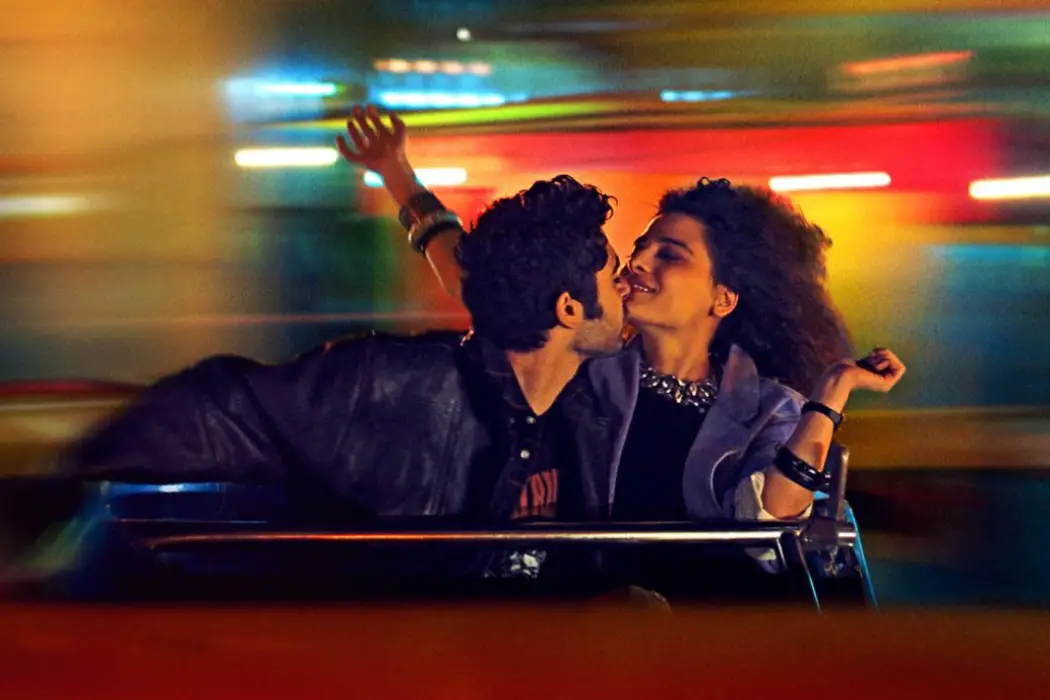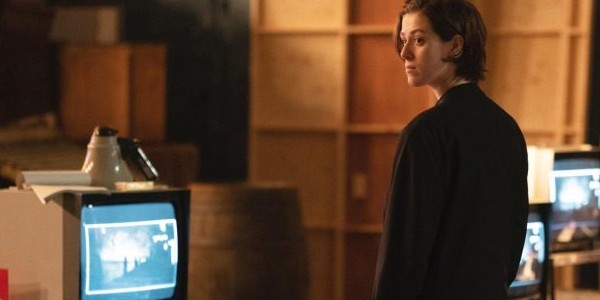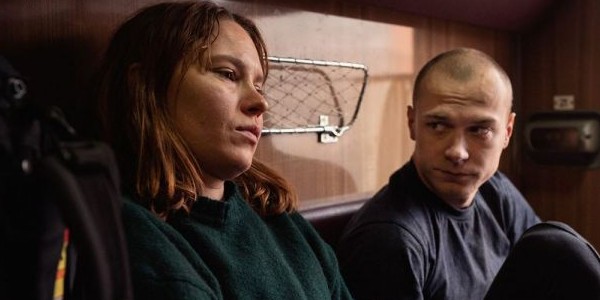London Film Festival 2021, Days 1-3: Superior Sequels And Deconstructing Documentaries

All I know is that Oscar Isaac would make a…
This year’s BFI London Film Festival gets into full swing after kicking off with the festival’s opening gala, The Harder They Fall. Our first dispatch covers a rare indie sequel, a Russian road trip, a documentary on Monument Valley, amongst others. Here’s what we saw over the first three days.
The Souvenir Part II (Joanna Hogg)
Paddy Wilson: The Souvenir Part II picks up almost right where the first part of Joanna Hogg‘s autobiographical two-parter left off. Julie (Honor Swinton Byrne), who plays a version of Hogg herself, is at her parent’s home recovering from the death of her heroin-addict boyfriend Anthony, while gearing up to make her graduate film – which follows her relationship with Anthony. It’s called The Souvenir. It makes you wonder how many times Hogg has treaded this very topic on film. While this should make for self-indulgence, fear not: Part II is even better than the first.

There were more than a few hints of self-indulgence in Part I, as though Hogg was a little too kind to Julie – her younger self – and unable to throw off the nostalgia goggles completely. Perhaps Part II feels more mature because Julie is. Perhaps Part I was meant to feel self-indulgent, as the way we do when we are in love. Either way, it means more characters get a greater look in. Tilda Swinton as Julie’s ‘Mummy’, now does more than just worry in grey hair, but smokes and takes pottery classes. Stranger Things‘ Charlie Heaton appears as an acting student to satiate Julie’s desire for intimacy – though perhaps he is too intimate.
More than anyone though, Richard Ayoade gets a beefed-up part as the blond-dyed diva director, Patrick. All the indulgence has been channeled into him. It’s a role so unlike Ayoade himself (a director in his own right), yet crammed with Ayoade‘s wit, that at times he feels transplanted in from another film, yet works as a foil to Julie’s own doubts about her directorial abilities. Julie’s creativity, and all the troubles and conflicts that come with it, make up a central part of the film’s second act. Her bravery in creating such a personal story, all the while managing a film set, is some of the best stuff in a film crammed with a lot of it, garnering our sympathy and will for Julie to succeed, which helpfully offsets the unrelatable nature of her wildly wealthy family.
Honor Swinton Byrne‘s performance here, a notch up again from the first part, makes you wonder why her IMDb isn’t crammed with more upcoming titles. A touch of self-indulgence rears its head when we see Julie’s short film within the film, which isn’t actually the film, but an abstract dialogue-less version of the first part. It saves itself with its Red Shoes visuals. And the film’s final moment, meta upon meta, might be too much for some, but for me – in this mood at least – put the bow on this gift of a two-parter.
The Taking (Alexandre O. Philippe)
Faisal Al-Jadir: “When the legend becomes fact, print the legend”.
While these eternal words uttered in John Ford’s The Man Who Shot Liberty Valance (1962) prove poignant in dissecting any historical narrative, they also, ironically, shed some light on the hypocrisy encapsulating the legendary filmmaker’s oeuvre.
Alexandre O. Phillipe’s latest documentary The Taking (2021) isn’t so much a film about talking heads but rather a narration formed by individual voices exploring the enigma and controversy surrounding Monument Valley’s longstanding iconography. In light of the fact that white settlers stole it from the Navajo people, it becomes quite telling when Ford seemed to have no qualms about manipulating the Valley’s geography to suit whatever story he was telling. While the documentary boasts arresting images of the landscape from Ford’s westerns and other media, the commentators (including Native American scholar Liza Black and film academic Christopher Frayling) inform the shifts in tone from mythic romanticism to dark deconstruction.
Phillipe ensures that we are reminded that the Navajo nation has not seen true justice to this day, with mentions of the cancers contracted from uranium mining, water theft by the federal government, and images of the infamous nineteenth-century concentration camp. With these crimes in mind, they force us to look at Ford’s incorporation of the valley into films, such as Stagecoach (1939), as a way of reinforcing the white saviour narrative that the Western was founded on. However, this documentary isn’t entirely interested in the ethnic cleansing of a people, but rather the relationship between the valley’s artistic depictions and the eyes of the American public.
Even with a lack of indigenous voices in the proceedings, the film succeeds in its examination of art’s effect on reality and the selective memory that accompanies the images we see.
The Good Boss (Fernando León de Aranoa)
Paddy Wilson: In Fernando León de Aranoa‘s The Good Boss, Javier Bardem‘s Julio Blanco plays the boss of a scales company. They design, produce and sell weighing scales across Spain, while Bardem‘s boss meddles in the lives of his employees in pursuit of a business award. The company has earned a whole collection, which conveniently hangs in Blanco’s house. Like Lady Justice who has her own scales, Bardem‘s boss doles out his awards and punishments based on his own sense of – not so blind – justice.

Blanco tells his workers: your problems are my problems because employees are family. And for a little while, that seems true. An elderly employee Blanco has roped into fixing his pool’s water filter on a Sunday morning asks for a favour: as my problems are yours, can you help my youngest son, in trouble with the law for a racially motivated assault? Blanco, with a compassionate but authoritative hand on the shoulder, helps the son out. But the compassion decreases and the authority increases as we see why Blanco wants a hand in his workers’ lives. Control.
Once Blanco’s problems begin to mount up, we start to see who he really is. We start to see what has earned Blanco the awards: a workplace balanced by literal blood, tears, and, sometimes, bullets. Under the guise of trying to help others, Blanco intervenes in his employees – and employees’ family – in order to help himself. Even who they sleep with. ‘I’m sick of a healthy democracy’, he declares. He doesn’t run the business like a dictator, but a totalitarian.
Selected to represent Spain in this year’s Oscars race, Aranoa‘s film isn’t as heavy as it sounds. It’s consistently funny – often very – and a satire that pulls of no mean feat. It stays light on its feet carrying heavy topics. And at its heart is a great Bardem performance. The Spaniard’s Heathcliffian leading man looks make it easy to overlook his character actor credentials, but here the actor who refers to himself as a ‘worker’ pulls of the managerial charm in rectangular spectacles and slight belly with aplomb.
Some of the best, and most amusing, moments come when Blanco finds himself in sticky situations where he needs to keep a straight face, appear normal, to not give the game away. There’s more than a vague reminiscence of the exhaustion of a Coen Brothers character who faces mounting problems. Except in this case, as with most ‘good’ bosses, Blanco has the resources and power to deal with their problems, with others deal with the consequences.
Memory Box (Joana Hadjithomas and Khalil Joreige)
Faisal Al-Jadir: The beauty of Memory Box isn’t so much in how its central mystery unravels, but in how it informs the choices the protagonists make in order to convey their version of the truth.

Directed by Joana Hadjithomas and Khalil Joreige (based on the former’s personal accounts), the film centres on teenaged Alex (Paloma Vauthier) and her Lebanese mother Maia (Rim Turki), both of whom live in Montreal, Canada. As a teenager, Maia fled Lebanon during the Civil War after the death of her father and brother. A mysterious box arrives at their home, containing a young Maia’s (Manal Issa) audio recordings, diaries, mementos and photographs, which Alex investigates and quickly puts together an intimated, nuanced portrait of the mother who seemed to be at a distance.
Beautifully photographed, the film enjoys a kaleidoscopic approach to its execution. On the one hand it plays like a film noir and gothic romance, complete with a bleak wide shot of the snowy suburban house haunted by ghosts of the past. On the other, it enjoys the liberties of a vibrant coming-of-age film, deftly interweaving the innocence and optimism of youth with the cynicism and danger of the changing environment.
In both past and present, the mother and daughter use media and photography to document dreams, desires, fears, and struggles, while trying to paint something eternal and romantic. Images matter, as the filmmakers draw parallels between their characters using photography as a means of expression and personal identity, and the way the cinematic medium is used to play with memory, space, and time in order to construct a reality the protagonists would rather remember.
Memory Box is not only an endearing experience about friendship and forgiveness but serves as a poignant metaphor for a people that never loses hope.
Compartment No. 6 (Juho Kuosmanen)
Paddy Wilson: Vibrant titles bookend Juho Kuosmanen‘s Compartment No. 6, jarring with the grit, soot, smoke and snow of the film in between, which you might expect the where and when of the story: early 1990s Russia. The story in question concerns a reticent young Finnish archeology student, Laura (Seidi Haarla), whose lover, her life-of-the-party tutor Irina, has backed out of the trip they planned together: visiting the petroglyphs – ancient rock drawings – in Murmansk. Laura sets off, with perhaps more than a nudge from Irina, by herself. In – you guessed it – the sixth compartment on the train, she meets Ljoha (Yuri Borisov), a similar-aged bald-headed, boorish and blunt compartment companion from hell.

The script sets itself a mountain to climb as Ljoha’s first impression is truly awful. A contrast to Laura’s sweetness, which we see in smooth tracking shots that follow her every move, Ljoha is sexist, jingoistic and crass. I clocked out of their love story before it begun, with folded arms telling myself Kuosmanen and co-writers Andris Feldmanis and Livia Ulman had made him too unlikeable to start.
But scale the mountain they do – with help in the form of charming performances of Haarla and Borisov – and my arms gradually unfurled as Ljoha’s own exasperating behaviour turned to sweetness. His rudeness is recast as boyish, jumping out at Laura from behind train doors no longer infuriating by endearing.
Kuosmanen shows off his wintry setting by focusing on the glints of gold within the post-Soviet grime. Strangers gift homemade booze to Laura in a show of Russian generosity. Ljoha’s ‘old lady’ – not a mother, apparently, but ‘better’ – gives food and hospitality to Laura with no questions asked, the most natural thing in the world. Like Ljoha himself, what seems like unpleasant surroundings reveal themselves to be appealing.
A road trip movie where – shock – the journey turns out to be more important than the destination, Compartment No. 6 could seem like a Russian/Finish retelling of Before Sunrise. Thankfully, it’s more than that. Driven by endearing performances, an impressive script and unusually attractive setting, it has a charm all of its own.
All My Friends Hate Me (Andrew Gaynord)
Paddy Wilson: Horror, perhaps somewhat surprisingly, is a genre that thrives on change. Almost everything can be frightening. Get Out showed us the terror of liberal America. The Father showed us how dementia can be frightening. And the dark comedy All My Friends Hate Me reveals how social anxiety can produce horrifying effects. 31-year-old Pete (played by co-writer Tom Stourton), recently back from helping refugees, is off for a birthday weekend with his university mates. As soon as the weekend begins, however, his friends seem off and start acting strange. Pete doesn’t know if he’s paranoid or part of a joke.
As Phoebe Waller-Bridge noted, ‘When an audience is laughing with a character, they make themselves so vulnerable… They expose their heart the moment they’re laughing.’ It’s in this exposure that the film slips the fear in. Social anxieties are ticked off one by one and felt sharply beside the humour. A joke falls flat. A gag you thought was funny is actually in bad taste and people get offended. You’re not on form and your party is dull. Worst of all, you’ve changed.
We stay with Pete enough to see the world through his eyes, but also distant enough to recognise his faults and social slip ups, which cleverly allows us to understand why his friends might actually dislike him. It works well, as does the blend of comedy and horror. There are no jump scares, but there’s psychological scares a-plenty. Dustin Demri-Burns is the standout alongside Stourton as Harry, the movie’s ostensible villain, a local picked up in the pub that Pete is certain is out to get him. You know that guy that your friends all like but you can’t stand? Dial it up to 11, and that’s Harry. The post-university relationships feel real, too: the constant ‘mate’ tagged onto the end of the sentence as though they’re willing the closeness back into existence; the quickness to revert to reminiscence when the conversation is lulled.
For anyone who has ever felt social paranoia among friends, All My Friends Hate Me will be scarily familiar.
Stay tuned to Film Inquiry for more reviews from LFF!
Does content like this matter to you?
Become a Member and support film journalism. Unlock access to all of Film Inquiry`s great articles. Join a community of like-minded readers who are passionate about cinema - get access to our private members Network, give back to independent filmmakers, and more.













